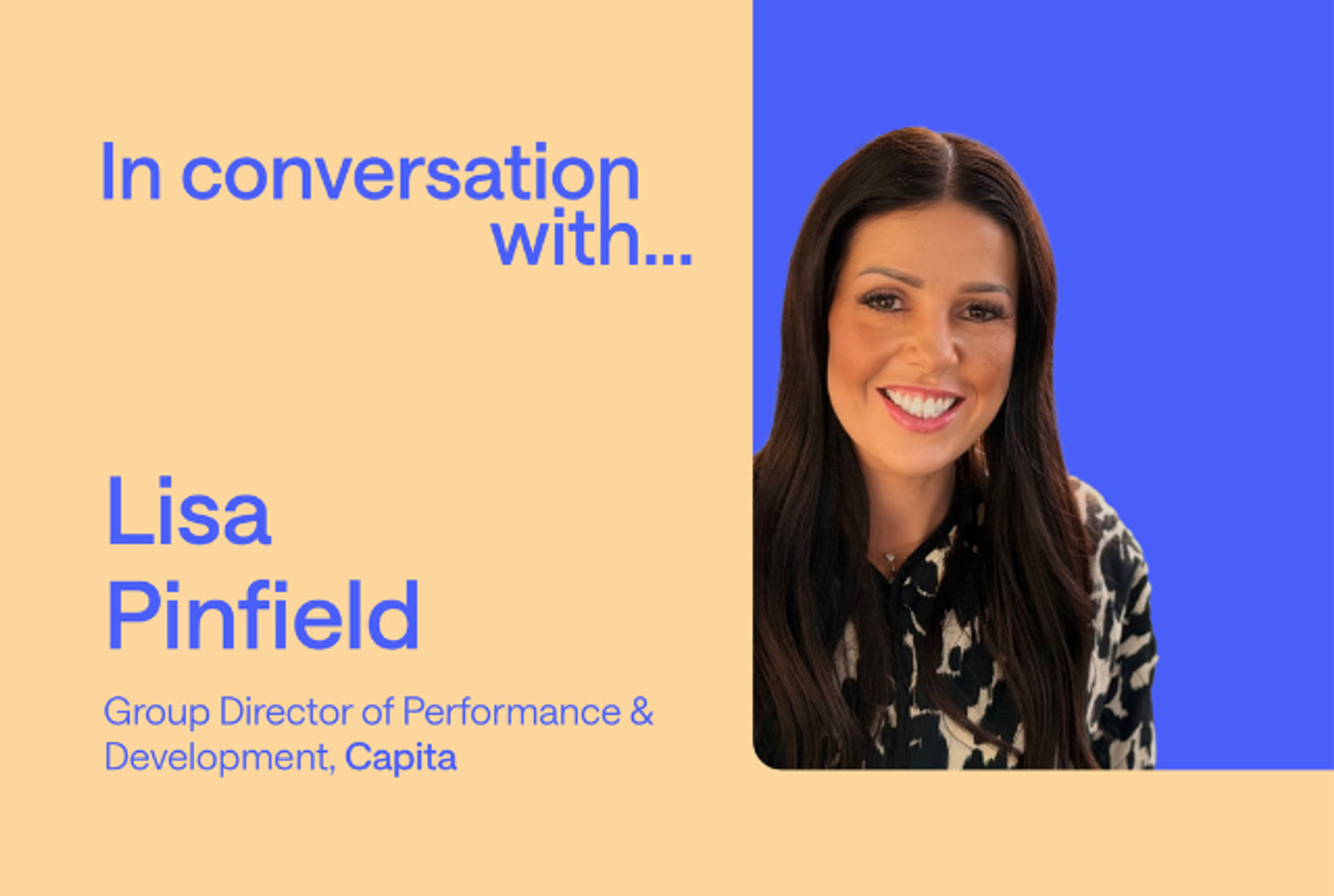In the first of our new series of sit-downs with leaders in the world of data, AI, and workforce skills transformation, we spoke to Lisa Pinfield, Group Director of Performance and Development at Capita.
Capita launched its Data and AI Academy last year, designed to equip employees with new skills to use AI responsibly and drive business outcomes.
Lisa told us about her vision for AI skills at scale, the value of internal storytelling, and her lessons for leaders embarking on multi-year transformation journeys.
First things first. Can you tell us a little about your experience, your role at Capita, and your career journey to your current role?
I’ve been with Capita for 19 years and have a broad remit, looking after all things performance and development, culture, responsible business, and our early careers and apprenticeship offer.
I fell into learning from recruitment, and developed a fond love of lifelong learning as a result. When I left school, I went straight into an apprenticeship with a car manufacturer, and then joined Capita in a recruitment role, where I was lucky enough to study my CIPD part-time to get my HR qualifications.
Recently I’ve done my Master's in Leadership as well, funded through the Apprenticeship Levy, which was a fantastic opportunity to go back and study. So I’m a huge advocate for all things apprenticeships!
How is Capita approaching the opportunity of AI?
AI is fundamental to Capita’s ‘Unlocking Value Together’ strategy. We’re helping to reduce operational costs for our customers and enable them to provide higher-quality work to their employees, by removing repetitive and mundane tasks.
We’ve been partnering with several local authorities on proof of concepts to test out new AI tools. For example, we're helping advisors in our contact centres with a more human-centred and empathetic approach to how we deal with customer enquiries. AI allows us to listen to live conversations and seamlessly stitch together the council services in the background. It equips advisors to answer many enquiries much faster. It’s reduced our average call handling times for clients by 20%, which has a brilliant impact on our customer service and CNPS.
A separate trial for the British Army uses AI to streamline and process medical records, reducing processing times for applicants by 30%.
We're also drawing on the expertise of the highest calibre AI engineers and partnering with technology hyperscalers, including the likes of Microsoft ServiceNow, Salesforce and AWS, to develop efficient, ethical, impactful solutions, which now underpin our operations.
How is AI transforming the skills teams need at Capita?
We’re having to think about skills in a completely different way. As part of our workforce planning strategy and the work of my team, we’re looking at how we augment humans with the AI capability we’re bringing in – it’s a huge shift in mindset.
I’m really thinking about the skills the organisation needs in the future. The reality is that AI is transforming how teams operate, automating more repetitive tasks, and simplifying workflows.
It’s allowing us to focus on different skills, and for us, we’re prioritising data literacy. The AI we’re using is only as good as the data that we’ve got. We’re therefore trying to enable teams to interpret that data as fluently as possible. It doesn’t mean we’re training everybody to be data scientists, by any means, but it’s giving anyone the fundamental skills to ask the right questions, and critically analyse AI-generated insights to make better informed decisions.
We’re also looking at the behavioural skills that go alongside that, creating curiosity and an adaptive learning mindset. For instance, we need higher levels of emotional intelligence than before to help with critical thinking and problem-solving.
One way Capita is taking action has been launching the Data and AI Academy. Can you tell us how that idea came about and the goals of the programme?
The Data and AI Academy has been fundamental to us shifting the dial. The need came from a multitude of different skills we were looking to develop, particularly around technical proficiency.
For our employees, it’s about understanding the benefits of AI, the basics around data science and machine learning, as well as AI literacy. Ethical considerations and the responsible use of AI are also massively important.
We can’t underestimate AI's impact on frontline colleagues, so we’re focussing on adaptability: giving individuals the skills to be curious and continue to learn. We want our employees to make that human judgement and be creative for the parts that AI can’t replicate.
Data management and analysis is another area. We want to ensure everyone understands data governance, security practices, and the data lifecycle.
We’re proud of the programme we’ve built in partnership with Multiverse. We’ve got 86 learners on the AI for Business Value apprenticeship, and that's had a significant impact on our business.
I’m also incredibly proud of the materials we’ve built together for colleagues who sit out of the Levy-funded options. It’s important we’re developing AI literacy right across the business.
What made you decide to work with Multiverse?
The reason we chose Multiverse was their ability to demonstrate thought leadership in the AI space. We felt that out of all of the providers that we have worked with, or we went through a procurement exercise with, Multiverse was able to demonstrate the link to the actual business benefit.
Multiverse took the time to understand the transformation and change journey that Capita is on, and build something that was appropriate and meaningful to our employees.
The flexibility that Multiverse has given us on content and delivery styles for different audiences, from lower levels to leadership, has been fantastic, and we've seen a huge impact from that.
The biggest thing is true partnership. It's listening, it's understanding each other and building something that's successful together.
What’s the biggest success you’ve seen from the AI Academy? And what are you proudest of so far?
I’m proud we’ve got people talking about AI and the impact it can have while dispelling some of the myths.
It’s been lovely to do some internal storytelling around people's success on the programme. We often do things like fireside chats where individuals share their proof of concepts. One apprentice recently shared the impact of manual processing changes they’d made within back-office operations. Hearing somebody bring it to life and talk with such fluency around their AI solutions was fantastic.
I’m also hugely proud of our Microsoft 365 Copilot rollout, which is happening across the business. Using the AI for Business Value programme, we’re integrating our internal learning alongside how we’re developing Copilot's impact on our business.
How are employees responding to AI-driven changes in workforce development and skills programmes?
The business has undergone a huge transformation, and naturally, there has been a lot of scepticism about AI replacing human interaction. What this programme has done is demonstrate the advantages that you can have with AI. Our employees are now much more curious – the programme has made them keen to be involved and learn more.
Where there was maybe a fear of job displacement or reluctance to change previously, we’re finding that people are embracing AI.
Learners on the apprenticeship sharing their stories and successes has been fantastic – it’s bringing more people to the table and making them want to be part of the journey. We’re now seeing the knock-on effects where we’ve got people breaking down the door to be part of the next cohorts – it's exactly the success we wanted to get.
Let’s talk strategy. How does workforce transformation in AI support Capita’s broader strategic goals?
A big part of my role at the moment is leading our cultural transformation globally, and emphasising AI's ethical and responsible use across the business. It’s part of our Better Company pillar, which ladders up to our Unlocking Value Together strategy.
We have to align our cultural transformation with AI, so we can drive operational efficiencies, improve governance, and create better skills development to support our tech-enabled culture and future.
We're also refreshing our values at the moment, which I’m leading. It’s been fantastic hearing people so energised in focus groups about the opportunity that AI and data presents, and the opportunity to think about their roles in a different way – less transactional, and more creative and problem solving work.
What’s the biggest hurdle you’ve had so far on that journey, and how have you overcome it?
Navigating budget constraints. We've had to be as creative as ever to help individuals through that change journey, but also to give them the skills they need for the future.
So we've been repurposing a lot of our content – and challenging the art of the possible, utilising AI ourselves internally to create better materials and content.
Without our partners investing time to understand some of those challenges and be on that journey with us, it wouldn't have been such a success. So we’re grateful for the support Multiverse has given us.
Do you have a piece of advice that you’d share with other leaders looking to embark on a similar journey?
Don’t underestimate the change journey. For us, it’s a multi-year strategy – and not something that will happen overnight. We’re introducing AI and continuous improvement initiatives to change employees’ perceptions and drive teams to work together differently over time. But, it’s required strong leadership in that process.
We’re investing lots of time with our senior leadership team to help develop their skills. We want our leaders to become real advocates for changing workforce planning and viewing career pathways differently.
To build a truly augmented workforce, you must make sure all members of the organisation – at all career levels – are equipped with the right skills and tech. It's simple things. Make sure they've got the right equipment, they've got the right tools, but then to allow them to trial things and have a safer space to fail.
And finally, collaborate in strong partnerships. That’s the biggest element for me that’s been successful.
When you look at the year ahead, what are the trends shaping your role, and what are you doing to prepare?
I’m super excited about 2025. It will be keeping up with the rapid pace of change now – things are moving and accelerating faster than ever before. We’re using our budget as creatively as possible to upskill people to get ahead of that change.
Our business is hugely ambitious for its transformation with AI, and what we’re doing for our clients and customers. I can’t let our people down in giving them the skills to deliver what we’re expecting.
I’m also thinking about AI-driven learning experiences. We should practise what we preach and focus on social and collaborative learning to help individuals accelerate their growth. So we will be focused on upskilling and reskilling.
We all talk about the future of work, but do we understand what the future of work looks like in enough detail? We’re putting a lot of focus into that.
A practical challenge for me is ensuring that our remote workforce are still feeling part of that change journey, and adapting to our generational workforce and the differences that brings, as well.
One principle we have at Multiverse is that learning should be available for everyone at every age, and every stage. How is Capita considering this across the generational workforce?
Having five generations in the workplace is hugely exciting, but it brings lots of differences and lots of change. Multiverse has challenged our thinking around making sure that we have learning available to all different generations. Some Capita employees have been with us for a long time, and their roles are changing.
I’m sure that in some organisations those skills would be written off. Instead, it’s about looking early enough to ensure we are reskilling and upskilling. Individuals have got so much capability to do different things. We just need to make sure that we're challenging them in the right way, and giving them accessible, digestible content that’s relevant to their role.
I don’t think any inward learning team can do this on their own. Having truly great partnerships where you understand each other, you trust each other, and you can bring in the experts to fill gaps for you works wonders.
National Apprenticeship Week is coming up. How do you perceive the importance of apprenticeships at Capita?
On a personal level, apprenticeships have really supported me. They helped me at the start of my career, and I've now got a Master's funded through the Levy too.
Apprenticeships give fantastic opportunities to school leavers, but they are also an incredible mechanism for upskilling and reskilling. That's where we’ve tried to dispel myths at Capita – we’ve had over 700 learners go through apprenticeship programmes in the last couple of years. It's fantastic to see skills development in management, leadership, data and AI, where we're seeing huge impact and change.
The Levy allows us to partner and think about things in a slightly different way, using it as a mechanism to upskill our workforce. I’d encourage other organisations to think a little bit more outside the box about how you can use some of the apprenticeship standards that are out there to add business value.
So I will always continue to advocate for apprenticeships. It's hugely exciting to see how they develop and change individuals.
And finally, let’s end on a fun one… in an ideal world, what’s the one dream task you’d like AI to do for you?
I’d love it to manage my teenagers’ emotions for me! But joking aside, for me it would be to create a continuous learning culture of growth and curiosity. I’d love it if AI had a magic way to consistently embed that spirit of constant learning and growth into individuals and across the business.
It’s maturing and it's learning at such a rapid rate. Who knows what AI will do in the future?




